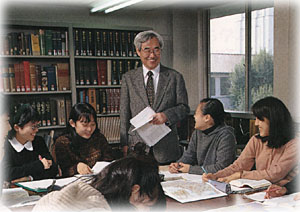Graduate School
The curriculum of the Graduate School of Humanities centers around the training
of researchers through a five-year process of integrated education through the first and
second stages of doctoral program. The Division of History established in 1993 has had
both the first and the second stages of the doctoral program since 1995. Generally in the
first stage of the doctoral program, students develop deep scholarship from a broad
perspective and are trained in research skills in their respective Divisions as well as
the skills needed for jobs requiring advanced specialization. Most classes are in the form
of lectures or seminars. Completion of the first stage requires 32 credits, with electives
from areas outside the candidate's specialty also being accepted. Most Divisions also
accept up to 10 credits from other graduate schools with which Japan Women's University
has a special agreement.
 In the first stage of
the doctoral program, students master specialized research methodology and submit their
master's thesis. By contrast, in the second stage of the program these methods are
actually applied to the student's specialty. Faculty members offer individual guidance in
the preparation of the doctoral dissertation.
In the first stage of
the doctoral program, students master specialized research methodology and submit their
master's thesis. By contrast, in the second stage of the program these methods are
actually applied to the student's specialty. Faculty members offer individual guidance in
the preparation of the doctoral dissertation.
The Divisions, as one means of encouraging student research, hold a symposium in
the fall at which students report on their unfinished master's theses. All faculty members
and students participate in these conferences, generating a lively exchange of opinions
and helping students complete their dissertations. Many Divisions also organize
conferences at which students scheduled to submit their doctoral dissertations announce
the results of their research.
The curricula for each specialty in the Graduate School of the Humanities has
its own unique characteristics. In the Division of Japanese, which consists of the fields
of Japanese language and literature, students are taught not only by the university's own
professors, but also by outside specialists where desirable, including visiting lecturers
from abroad. The program is delivered through a mixture of lectures and seminars, and the
library provides the resources necessary for re-search into every period of Japanese
literature. The Division of English's specialties include English Literature, American
Literature, Linguistics, American Studies, and British Cultural Studies. In the second
stage of the doctoral program, students are expected not only to carry out specialized
research projects, exploring new areas within their field, but also to begin to acquire
the instructing skills
necessary for an academic career. With its specialist teaching staff, and its
well-resourced library and computer facilities, the Division expects to produce scholars
who will devote themselves to learning and who will contribute to the academic culture of
Japan. The Division of History's specialties include the histories of Japan, of the Orient
and East Asia, and of Western Europe; the Division's most distinctive feature is the
comparative method of study it pursues. Students are also given a full grounding in
historiography to equip them with the academic and technical expertise to work in
historical archives.
